Jean Piaget was a French-speaking Swiss developmental psychologist and philosopher known for his epistemological studies with children. His theory of cognitive development and epistemological view are together called "genetic epistemology. " He believed answers for the epistemological questions at his time could be better addressed by looking at their genetic components. This led to his experiments with children and adolescents in which he explored the thinking and logic processes used by children of different ages.
Piaget's theory of cognitive development is a comprehensive theory about the nature and development of human intelligence. Piaget believed that reality is a dynamic system of continuous change and as such, it is defined in reference to the two conditions that define dynamic systems. Specifically, he argued that reality involves transformations and states. Transformations refer to all manners of changes that a thing or person can undergo. States refer to the conditions or the appearances in which things or persons can be found between transformations.
Piaget explains the growth of characteristics and types of thinking as the result of four stages of development. The stages are as follows:
- The sensorimotor stage is the first of the four stages in cognitive development that "extends from birth to the acquisition of language. " In this stage, infants construct an understanding of the world by coordinating experiences with physical actions–in other words, infants gain knowledge of the word from the physical actions they perform. The development of object permanence is one of the most important accomplishments of this stage.
- The pre-operational stage is the second stage of cognitive development. It begins around the end of the second year. During this stage, the child learns to use and to represent objects by images, words, and drawings. The child is able to form stable concepts, as well as mental reasoning and magical beliefs.
- The third stage is called the "concrete operational stage" and occurs approximately between the ages of 7 and 11 years. In this stage, children develop the appropriate use of logic and are able to think abstractly, make rational judgments about concrete phenomena, and systematically manipulate symbols related to concrete objects.
- The final stage is known as the "formal operational stage" (adolescence and into adulthood). Intelligence is demonstrated through the logical use of symbols related to abstract concepts. At this point, the person is capable of hypothetical and deductive reasoning.
When studying the field of education Piaget identified two processes: accommodation and assimilation. Assimilation describes how humans perceive and adapt to new information. It is the process of taking one's environment and new information and fitting it into pre-existing cognitive schemas. Accommodation, unlike assimilation, is the process of taking one's environment and new information and altering one's pre-existing schemas in order to fit in the new information.

Jean Piaget
Jean Piaget was a French-speaking Swiss developmental psychologist and philosopher known for his epistemological studies with children.